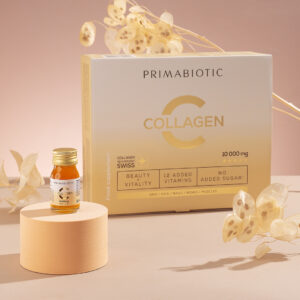
What Is Collagen? Benefits, Types, and Why Your Body Needs It
What is collagen? It’s the body’s primary structural protein, forming the foundation of our skin, joints, and bones. While naturally present in the body, collagen production decreases with age – which is why there’s growing interest in its role and the possibility of replenishing it through diet and supplementation. Let’s explore what collagen is and why it matters.
Collagen – What Is It?
Collagen is the most important structural protein in the human body, making up around 30% of all proteins. It’s the main component of connective tissue and is responsible for the strength, elasticity, and cohesion of various tissues. It’s found in the skin, bones, teeth, cartilage, blood vessels, corneas, and internal organs, where it acts as a structural scaffold.
Animal-based foods that are rich in collagen include pork skin (e.g., pork knuckle), tendons, cartilage, veins, and processed meats like sausages made from connective tissue and ground skin. Other natural sources include organ meats, pâtés, eggs, fish and pork aspic, head cheese, chicken feet, and collagen broth.
Collagen is primarily composed of glycine, proline, hydroxyproline, and hydroxylysine – amino acids that give it flexibility and resilience. There are many types of collagen, each with a different structure and function, but Type I collagen is the most abundant in the body.
While the body naturally produces collagen, levels begin to decline from around the age of 25, with a significant reduction after age 50. This process may be accelerated by factors such as sun exposure, hormonal changes, intense physical activity, and even the use of certain cosmetics.
What Are The Benefits of Collagen?
When asking what is collagen, it’s also important to understand its functions. Collagen plays a critical role not only in the skin but also in joints, bones, and blood vessels.
Key benefits and properties of collagen include:
- Supporting skin elasticity, firmness, and hydration
- Strengthening bones, tendons, and cartilage
- Supporting the integrity of blood vessels and internal organs
- Promoting stronger hair and nails
Different types of collagen perform different roles. For example, Type I collagen supports skin and bones, while Type II collagen maintains joint elasticity. In youth, the body can produce up to 3 kg of collagen annually.
With age – and under the influence of oxidative stress, UV exposure, poor diet, or smoking – collagen production declines, and existing collagen fibres degrade. Maintaining adequate collagen levels is key to healthy ageing and physical well-being.
Is Collagen Good for You?
Collagen supplementation can be beneficial because a deficiency may negatively impact the skin, nails, hair, and overall health. The natural production of collagen starts to slow from the mid-20s, with more noticeable decline as we age.
Replenishing collagen through diet or supplements can offer broad support – particularly for physically active individuals, people going through menopause, or those exposed to high oxidative stress. Thanks to its properties, regular collagen intake may:
- Improve skin hydration and firmness
- Strengthen hair and nails
- Support joint and tendon recovery
- Enhance vascular health (especially when combined with vitamin C)
- Help slow visible signs of ageing
While collagen is not a substitute for a healthy lifestyle, it can be a valuable addition to a balanced routine – especially when natural synthesis begins to slow.
The Main Types of Collagen and Their Functions
The human body contains over 28 types of collagen, but the most significant are Type I, Type II, and Type III. Each type differs in structure, function, and location in the body.
- Type I – Supports tissue structure and elasticity; found in skin, bones, teeth, tendons, and ligaments.
- Type II – Provides flexibility in cartilage; key for joint health.
- Type III – Maintains elasticity in organs and blood vessels.
Understanding the differences helps in choosing the right type of collagen supplement depending on your needs.
| Collagen Type | Where is it found? | Function |
| Type I | Skin, bones, teeth, tendons, ligaments | Supports structure and elasticity of tissues |
| Type II | Cartilage | Maintains mechanical properties of joints |
| Type III | Skin, blood vessels, muscles | Supports elasticity and resilience of organs/tissues |
Source: Based on https://pmc.ncbi.nlm.nih.gov/articles/PMC8620403/
Type I Collagen
This is the most durable type of collagen – its fibres are said to have a tensile strength comparable to steel. Type I collagen makes up around 90% of all collagen in the body.
- Found in skin, bones, and tendons
- Contributes to skin firmness, wound healing, and tissue strength
- Highly compatible with the human body
Type II Collagen
Mainly found in joint cartilage, Type II collagen supports everyday mobility in knees, hips, elbows, and other joints.
- Helps maintain flexibility and cushioning in joints
- Decreases with age, potentially causing stiffness and discomfort
- Supplementation can support joint health and movement
Type III Collagen
This type forms reticular fibres and is mainly present in blood vessels, internal organs, and muscles.
- Dominant in newborn skin, contributing to its softness
- Plays a key role in the early phase of wound healing
- Declines with age, gradually being replaced by Type I collagen
Collagen – Key Takeaways
To sum up:
- What is collagen? It’s a fundamental protein that supports skin elasticity, joint function, and bone structure.
- There are many types of collagen, with Types I, II, and III being the most significant – each serving different functions in the body.
- Natural collagen production decreases with age, making diet and supplementation increasingly important.
- Collagen properties include aiding tissue regeneration, maintaining flexibility, and improving the appearance of the skin.
- While not a cure-all, collagen can be a powerful addition to a healthy lifestyle and self-care routine.
See also other articles:
